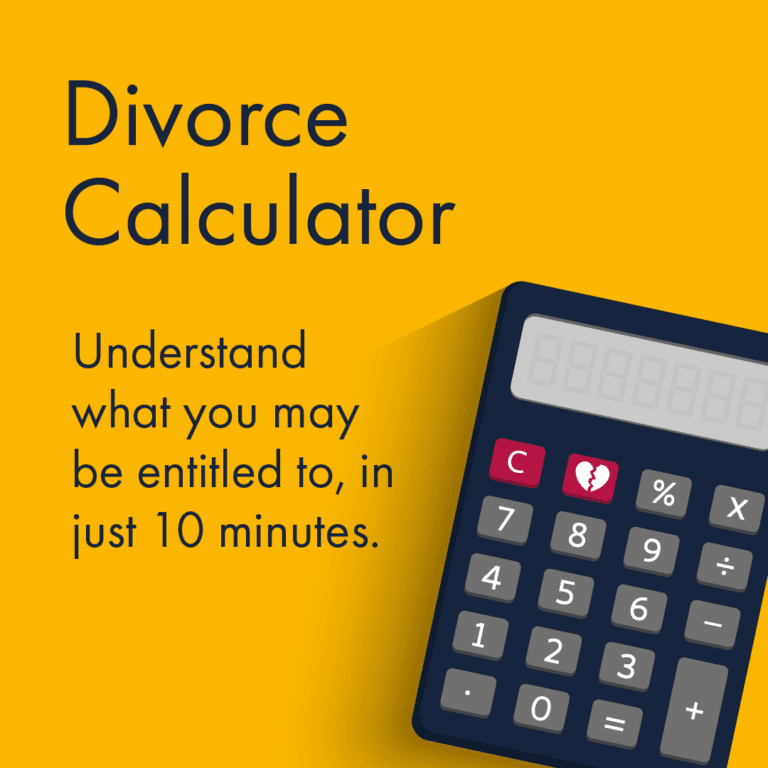 Use the calculator
Use the calculator
Can you hide assets before divorce
It is possible. Many try, but few succeed. Divorce and financial remedy cases require full and frank financial disclosure. When this is not provided, it is usually obvious.
While some people may succeed in deceiving their spouses or give them little to no evidence of a possible hidden asset, experienced family lawyers will know where to look.
In addition, the courts have the power to take into account people’s actions and responses in providing full and frank financial disclosure. If an answer to a question about disclosure isn’t adequate, the court can draw adverse inferences. This can lead to penalties in financial distribution. The court can also order the asset-hider to pay some or all of their spouse’s legal fees.
In short, you can try, but there is a penalty for hiding assets in divorce (UK).
-
Can I transfer money before divorce?
If this is the transfer of your own money, the answer is ‘yes… but’.
It is important to consider what money you are transferring before a divorce and whether this might be perceived later as trying to ‘hide’ assets or exclude them from the financial considerations in your divorce. It is vital to discuss this with your divorce lawyer before you transfer money.
If you are transferring money between you and your spouse, by agreement, in anticipation of your divorce, then it is also essential that you discuss this with your family solicitor before you do so.
It is important to ensure that any money transfers are made as part of an overall agreed plan and recorded suitably. One of the key risks here is that the money is spent and that your spouse may look for another payment in the future.
-
Will spending money before divorce make my settlement lower?
While there is very little to stop you, the sensible answer is ‘no’. It would be very unwise to spend all of your money before a divorce. The court could see such a move as an attempt to deprive your spouse of a fair share.
The likely outcome is that the court would consider penalising you if you spent most or all of your money before a divorce. If your spouse suspects that you might do this, your spouse can apply to the court for a freezing injunction, preventing you from dealing with any of your assets, to protect them for the divorce.
-
How can I protect my pension in a divorce?
The best solution is to seek a family law consultation on this subject and consider engaging the services of a Pensions Actuary or a Pensions on Divorce Expert (PODE) to consider the value of your pension(s) against those of your spouse.
It is also worth considering the proportion of your pension that might have accrued before your marriage to explore whether excluding a proportion in divorce financial negotiations is possible.
-
Can I transfer assets before divorce?
Yes, it is possible but transferring assets (as opposed to money) is a sure sign of an attempt to exclude it from a divorce settlement or financial remedy outcome. Apart from that, the courts can divide other assets to eliminate the effect of the asset transfer.
As with attempting to hide assets in a divorce, it is very difficult and incredibly risky. The courts can draw adverse inferences, which can lead to penalties in the financial distribution. The court can also order that the asset-transferer pay some or all of their spouse’s legal fees.
-
Can I sell my assets before the divorce is filed?
You can, but it’s likely to be perceived by the courts as an attempt to hide an asset or exclude it from a divorce settlement or outcome and may be considered suspicious. It could also colour the court’s view of all of your other dealings and responses to questions.
-
What are the consequences of hiding assets in a divorce?
If you’re caught hiding assets, or the court concludes that you have, it can distribute assets to compensate your spouse for the hidden or sold asset(s).
A clichéd example is a husband buying himself a brand new Porsche outright in the months leading to a divorce. The intention is to deprive his wife of a share of at least £100,000.
By the time the court considers the value of the Porsche, it may have halved. But the judge would be perfectly entitled to distribute assets leaving the husband with the full hit of the purchase, depreciation and transferring assets to the wife as if the £100,000 had remained in the savings account.
Ultimately, hiding/selling/transferring assets, to deprive a spouse of a fair share in divorce, and to deceive the court, is a fraud which is a criminal offence punishable by imprisonment.
-
Can I use trusts to protect my money during a divorce?
Trusts are often used to ‘protect’ assets in a divorce. While the family courts do not have investigatory powers like the police, they can ask probing questions. Inadequate answers and deficient disclosure will lead to adverse inferences being drawn and settlements eliminating the effect of the trust.
Genuine trusts are relatively transparent and appear fair and reasonable. When trusts are hard to explain and justify, the courts are suspicious. Equally, trustees can be brought into cases to justify the trust.
Invariably, creating a trust under false pretence to ‘protect’ money in a divorce will lead to the court drawing adverse inferences. Worthy trusts drawn up at the last minute before a divorce, even if honourable in purpose, also risk this court conclusion.

How long after divorce can my spouse claim assets?
It’s important to consider assets and incomes separately. If spouses divorce without addressing their financial affairs in a court order, known as a consent order, the answer is potentially indefinitely. But if one spouse remarries, they will lose the right to seek maintenance from their ex-spouse.
As for assets, claims many years after marriage and separation can and do happen. That is not to say that it would lead to a 50/50 split after 30 years of divorce, but in normal circumstances, say five years after a divorce, a claim can lead to a massive financial surprise.

Furthermore, even though divorce essentially resets inheritance positions, it does not prevent an ex-spouse from making a claim against the deceased’s estate. This can, therefore, lead to enormous distress and expense for relatives. The solution is to have a court order addressing financial claims that arise from divorce.
It is very important and prudent to divide and share assets at the divorce: savings, pensions, houses, debts and inheritances. Whether the agreement or settlement includes maintenance or not, a consent order approved by the court as part of a divorce will protect the agreement and prevent a ‘second bite at the cherry’ in years to come.
Get in touch with Stowe Family Law
If you want to learn more about protecting your assets during divorce, you need to protect your pension, or you just want general advice about divorcing your partner, please contact our Client Services Team today.
What our clients say
Newsletter Sign Up
Sign up for advice on divorce and relationships from our lawyers, divorce coaches and relationship experts.
Privacy Policy
